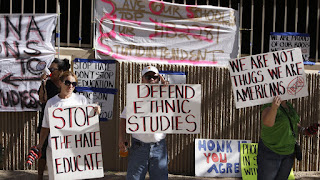Mexican Americans in Education
"A Critically Compassionate Pedagogy for Latino Youth" Julio Cammarota and Augustine Romero
"Building on Strength with Education, Respect and Trust" Ana Celia Zentella
"Precious Knowledge" Ari Palos and Eren Isabel McGinnis (filmmakers)
"Building on Strength with Education, Respect and Trust" Ana Celia Zentella
"Precious Knowledge" Ari Palos and Eren Isabel McGinnis (filmmakers)
While reading these two articles and watching the film, many emotions hit me. Sadness, pride in students, and anger are the three that stand out the most. Throughout history oppression of minorities has existed. And it continues into today's world. It would be ignorant to say that we are all individuals and race, nor gender, nor age, nor class play a part in the lives we live. The articles and film focus on Mexican American students in classes that aim to develop critical thinkers and academic leaders. When I say "academic leaders," I mean students who take charge of their own learning and go out in the community to make a difference.
It saddens me to think about the marginalization of Latino and Latina students. Public schools silence the voices of Mexican Americans and create an environment that feels foreign. This creates dysfunctional relationships between these students and school. When a student is banned from speaking his or her own language in the lunch room, it is very hard to feel at all welcome. Mexican Americans fill up the lower academic track classes because of oppressive policies such as forbidding language and cultural traditions. As Cammarota and Romero state, "As such, many Latino youth need opportunities to unlearn the passivity of a banking education, in order to become more confident and capable of expressing their own opinions and engaging in critical dialogue." These authors tell of a curriculum based on respect, admiration, and love. It is a program of critical thinking that cultivates intellect. Citizens who will go out and help their communities are born from this different type of education. This was also seen in the film, "Precious Knowledge," which focused on Ethnic Studies in Arizona. I was delighted to see Mexican American students in a class where they were able to talk about real issues that affect them. They were engaged and excited about the curriculum because it mattered to them. They even participated in standing up to injustice in their state.
I found myself getting very angry as I watched the bills to end Ethnic Studies being discussed. Words such as, hate, racist, and against Americans were used to describe the class. On the contrary, with only a glimpse at what the class really entails, I could tell that these classes advocated for love. Students feel comfortable and are able to learn about where they come from and how to change the world for the better. There was not one point during the segment that I had any inclination of the class being hateful against America.
Students do need to know where they come from. There is nothing wrong with being proud of who you are in the United States. I have seen how hard it can be for some students to feel safe and feel comfortable. It makes me sick to think that anyone would want to take away and safe place of learning away from students who need it. This article argues that ethnic studies could make children better students.
When children engage in academics as well as the issues in front of them, it creates a future of citizens who will make the world a better place. Zentella states, "The powerful love that children feel for the schools and teachers that celebrate the polyphony of their voices expand their repertoire of identities, and encourage them to embrace a limitless future can nurture them throughout life." I think that this means that we as teachers have a very important role to play in the lives of our students. We need to listen to them and guide them to think critically in their own worlds. There is more to teaching than the times tables and grammar. We need to give students a space to become the citizens of the future.

Hi Jill, I love your input on these articles. I have have. To say, I was feeling many of the same emotions as you shared while reading and watching these resources. As educators, we can’t help but to read these, and question if we are doing enough to give students the best environment for the way they feel and learn. I personally love the term “limitless future” you used when talking about how powerful love at schools can make students feel. My conclusion after reading many blogs and these articles is that I need to step it up and make changes. How about you?
ReplyDelete"Words such as, hate, racist, and against Americans were used to describe the class."
ReplyDeleteVery ironic that the words used against the class fit the people spewing that vile so well. As I said before on another person's blog, this is why we need to be vigilant when advocating for our students and think like politicians. Any opening to twist our words against us will be taken by those with an agenda. It's a reality that we have to accept and prepare for.
A thoughtful and painful reflection, Jill. I share these feelings too each time I watch the film. Some important takeaways for me from your post:
ReplyDelete- We must continue to acknowledge the persistence and pervasiveness of racism, even if it makes us upset. Educators (and others!) can't turn away.
- We can and must do more. Where to start? Our classrooms. But we can also connect with already-existing antiracist organizations to join the struggle for positive social transformation. Educators have an important role to play in social movements...how can we strategically link the classroom to social movements and local organizations?